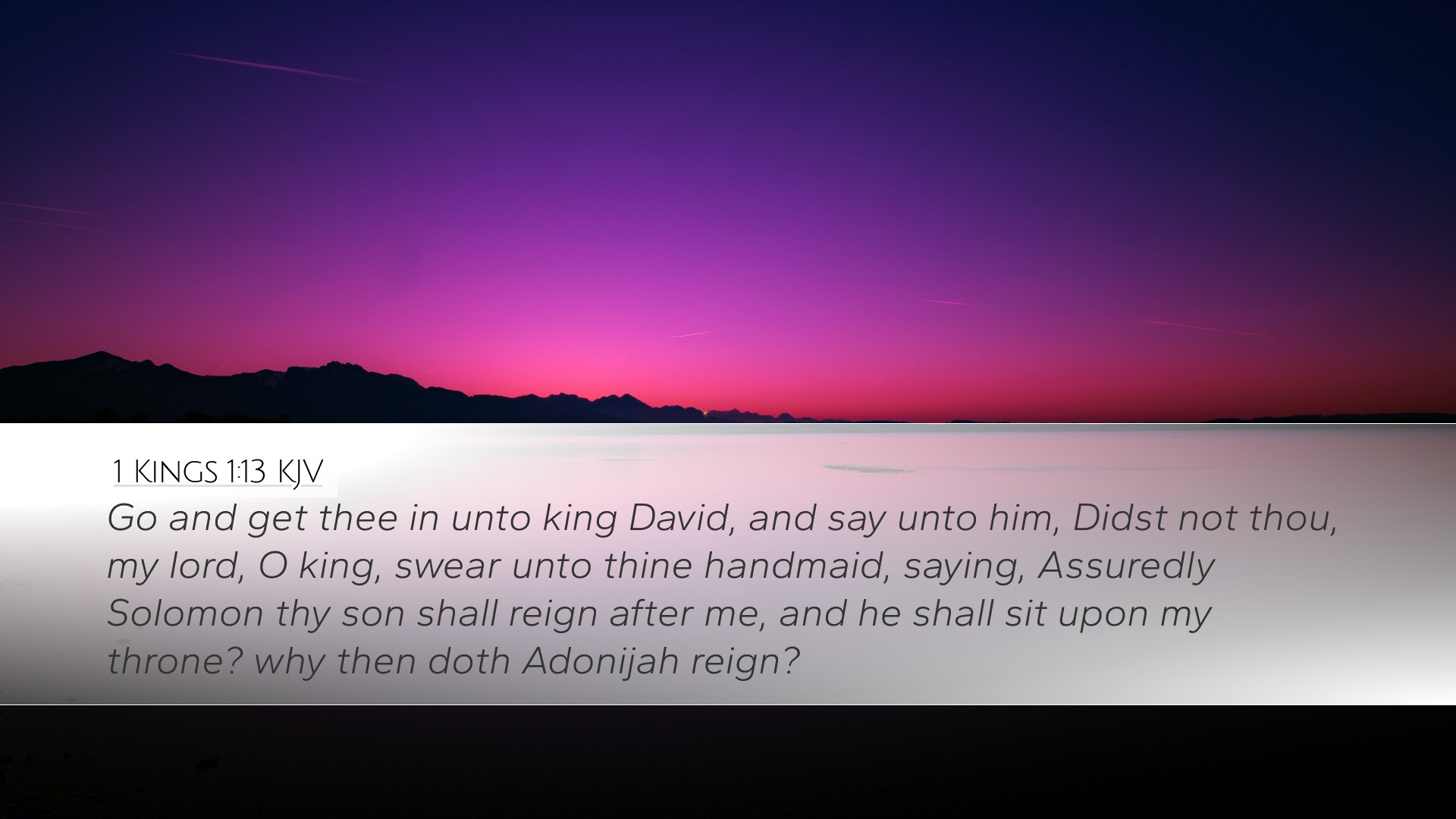Commentary on 1 Kings 1:13
Verse (1 Kings 1:13): “Go in unto the king David, and say unto him, Didst not thou, my lord, O king, swear unto thine handmaid, saying, Assuredly Solomon thy son shall reign after me, and he shall sit upon my throne? why then doth Adonijah reign?”
Contextual Overview
This passage takes place in a critical juncture of the transition of power within the Kingdom of Israel. King David is nearing the end of his life, and the struggles for succession begin to unfold. The verse encapsulates the tension between the rightful heir, Solomon, and the usurper, Adonijah. This situation reflects deeper themes of loyalty, the fulfillment of divine promise, and the consequences of human actions.
Key Themes
- Covenant and Promise: This verse directly alludes to a solemn promise made by David concerning Solomon’s succession. In 2 Samuel 7:12-16, God had established a covenant with David that his lineage would endure. David’s oaths carry significant weight in the context of God’s promises.
- Human Agency and Divine Sovereignty: The struggle for the throne between Solomon and Adonijah illustrates human attempts to manipulate outcomes, despite divine plans. While Adonijah attempts to solidify his reign, God’s purpose will prevail through Solomon.
- The Role of Women in God's Plan: The verse mentions David’s handmaid, Bathsheba, who interjects to remind David of his commitment. Her involvement highlights the crucial roles that women played in biblical narratives, often as agents of divine revelation.
Commentary Insights
Matthew Henry’s Perspective
According to Matthew Henry, this account emphasizes the “importance of keeping one’s word.” David's covenant with Bathsheba concerning Solomon was both a declaration and a divine instruction. Henry points out that this situation serves as a lesson on the responsibilities of leaders to uphold their promises. The role of Bathsheba also underlines how God can use unexpected individuals to fulfill His will, pressing the point that “God’s promises are sure, and what He has appointed, that stands.”
Albert Barnes’ Interpretation
Albert Barnes highlights that Bathsheba’s appeal to David was grounded in a sense of urgency and clarity. She recounts the promise made by David, emphasizing the need for acknowledgment amidst Adonijah's actions. Barnes notes, “The impropriety of Adonijah’s actions is clear; they not only defy David’s word but also threaten the divine order.” Barnes emphasizes the importance of prayerful clarity before acting, which applies here as Bathsheba seeks David’s intervention before it is too late.
Adam Clarke’s Commentary
Adam Clarke explores the implications of this passage, remarking on the political maneuvering surrounding the throne. He notes that Bathsheba’s advocacy is a pivotal moment, and Clarke articulates how this reflects the undeniable role of influence in securing divine promise against human ambition. Clarke also stresses that while men may have their plans, God’s purpose will inevitably come to pass, aligning with the prophetic assurances given to David.
Theological Implications
In examining this verse through the lenses of the commentaries, several theological implications are evident:
- The Nature of God’s Promises: God’s promises are steadfast, and the fulfillment of His will occurs irrespective of human failings. This serves as encouragement to believers that despite the chaos in leadership, God’s sovereignty is unaffected.
- The Responsibility of Leadership: Leaders are held to a divine standard to uphold their commitments. This verse serves as a reminder to current leaders in the church and secular institutions to reflect on their promises and align their actions with God’s standards.
- Human Mediation in Divine Plans: Bathsheba's role emphasizes the vital function of human mediation in executing God's plans. It illustrates that God often chooses to work through individuals who are willing to take a stand for justice and divine will.
Practical Application
This passage encourages introspection regarding our own commitments to both God and others. It compels us to consider how we respond when promises are threatened. Additionally, it invites leaders to reflect on the weight of their commitments in service to God’s kingdom. For students and scholars alike, this text serves as a reminder of the rich interweaving of human agency and divine purpose that resonates throughout the entirety of Scripture.
Conclusion
1 Kings 1:13 challenges believers across all spaces of theology and ministry to understand the importance of divine promises, the need for fidelity in leadership, and the profound impact individuals can have in pursuing God’s will. By embracing these lessons, we can navigate our own callings with wisdom and faithfulness, recognizing that ultimately, God’s intentions will prevail in His perfect timing.


